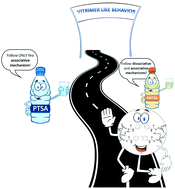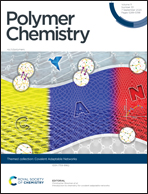Dynamic polyurethane thermosets: tuning associative/dissociative behavior by catalyst selection†
Abstract
Polyurethanes are one of the most versatile families of polymers and are one of the most widely used in thermosets. Due to their static cross-linked structure, they have limited capacity to be reprocessed, recycled or reshaped and therefore once these materials suffer any damage, they are typically discarded. One of the key features of polyurethanes is given by the dynamic behavior of the urethane group at high temperatures, especially in the presence of an appropriate catalyst. In this work a detailed study is performed to demonstrate the dynamic nature of aliphatic and aromatic polyurethanes in the presence of different catalysts. Our study shows that the dynamic behavior is highly dependent on the nature of the isocyanate, the urethane/free alcohol ratio and the nature of the catalyst that is used in the polymerization. We found that the stress relaxation of polyurethane thermosets in the absence of a catalyst is related to the degradation of the network and that the catalyst plays a pivotal role in enhancing the dynamic behavior prior to degradation, especially in aromatic polyurethanes. In fact, the organocatalyst p-toluensulfonic acid (PTSA) is shown to have the ability to enhance the dynamic behavior via hydroxyl mediated transcarbamoylation (associative mechanism) whereas dibutyltin dilaurate (DBTDL) catalyzes transcarbamoylation reactions via both associative and dissociative exchange mechanisms at temperatures as low as 120 °C. These results have been confirmed by model reactions performed with low molecular weight compounds. We believe that this work offers a significant insight into the influence of structural parameters and catalyst effects in the intrinsic dynamic behavior of polyurethanes, and moreover, provides new alternatives to selectively enhance the dynamic nature of polyurethanes.

- This article is part of the themed collections: Chemistry for Covalent Adaptable Polymer Networks and Polymer Chemistry Lectureship Winners


 Please wait while we load your content...
Please wait while we load your content...